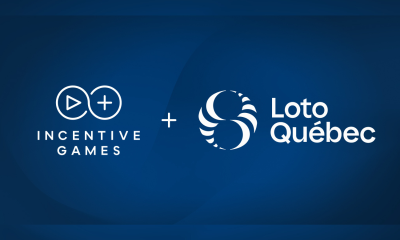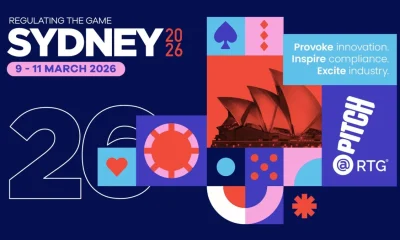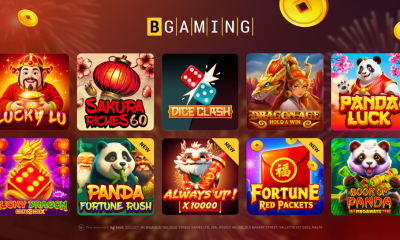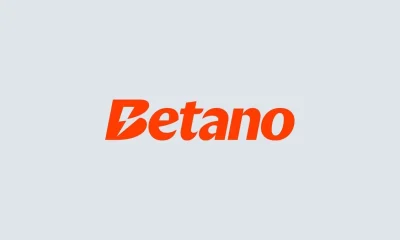eSports
Betway and Oddin.gg form strategic partnership for esports betting
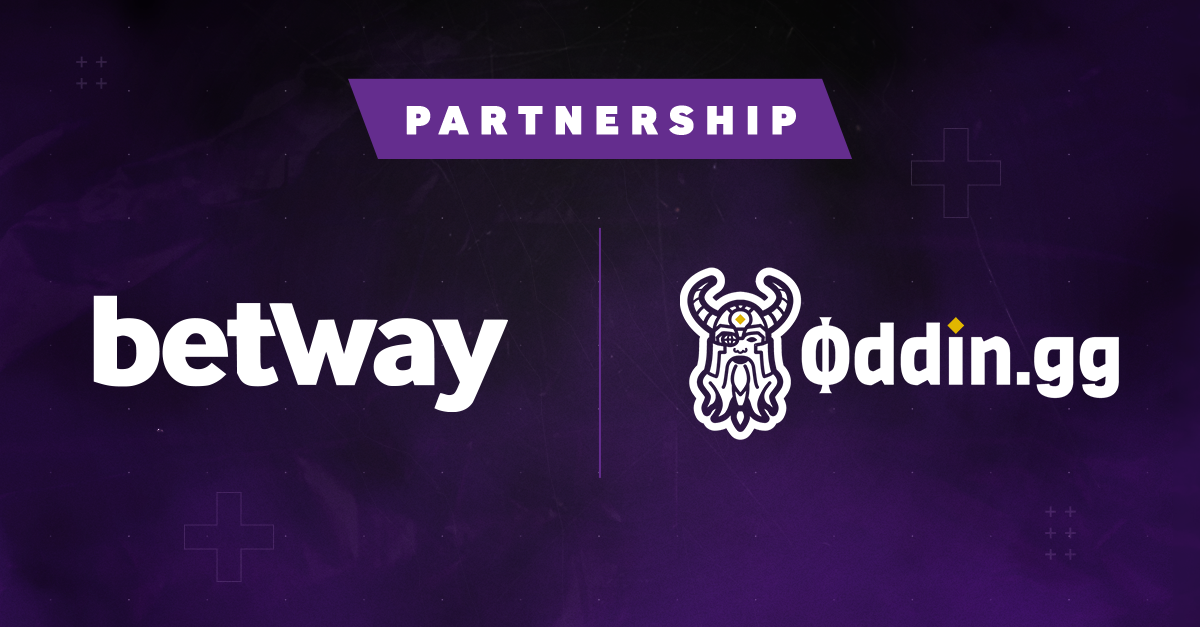
Oddin.gg, a leading provider of esports betting services, are delighted to announce a new partnership with global gaming brand Betway in a multi-year deal. The agreement will see Oddin.gg provide their odds feed and will help facilitate Betway’s continued expansion in the area.
Betway is a market leading sportsbook who have invested heavily into supporting esports, through product enhancements, best in class sponsorship and content marketing. It is the proud sponsor of some of the world’s biggest esports brands, including Ninjas in Pyjamas, G2 Esports and BLAST. This deal now sees Betway partnering with Oddin.gg, who are recognized for delivering the most engaging esports betting experience in the market, as they continue to improve their betting experience.
Adam Savinson, on behalf of esports at Betway, said of the partnership with Oddin.gg, “Oddin.gg have been at the forefront of esports trading innovation for quite some time, and we are delighted to finally partner up. Oddin.gg will help us take our esports product to new heights, and we are excited to start our journey together”
Oddin.gg Managing Director Marek Suchar asserts, “While many bookmakers still put business cases together to justify the betting potential of esports, Betway was the first global operator to see the undeniable trend and the potential of esports from the very beginning. Betway is by far the most recognizable fully regulated brand within esports betting. I couldn’t be more thrilled that we will be co-writing the next chapter of Betway esports, focused on an enhanced esports betting experience and user engagement. Esports bettors should be really excited!”
Oddin.gg is a world-leading B2B provider of iFrame solutions, esports odds feeds and risk management. It delivers the most engaging esports betting experience with industry-leading uptime and number of live markets. Oddin.gg always focuses on its clients’ profitability by combining state-of-the-art technology, machine learning algorithms, and advanced data science. The company features a team with more than 50 years of combined experience in esports and betting, and has successfully done business with the most complex global platforms. Recently, their application for a gaming license was officially accepted by the New Jersey Division of Gaming Enforcement.
Powered by WPeMatico
Call of Duty Warzone esports
Team Vitality Expands FPS Dominance Ahead of Esports World Cup 2026 With PUBG, Warzone and CrossFire Entry
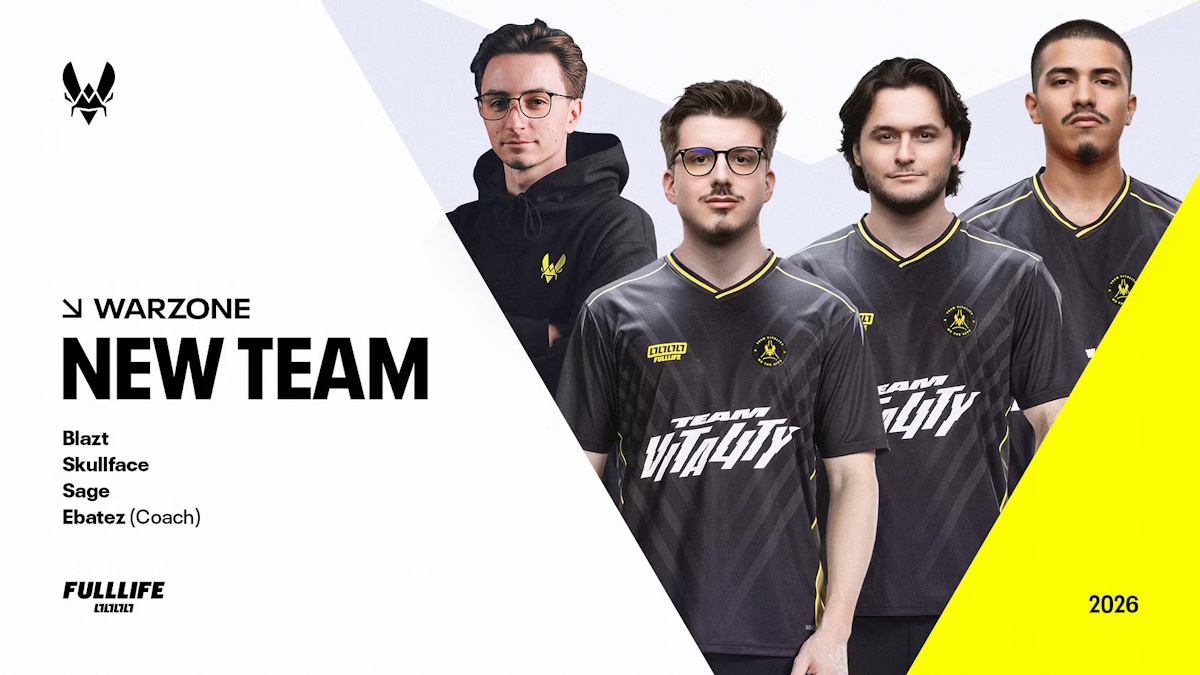
Team Vitality Accelerates FPS Expansion Ahead of Esports World Cup 2026
Team Vitality has officially announced a major competitive expansion ahead of the 2026 Esports World Cup (EWC), confirming its entry into three additional shooter titles: PUBG (PC), Call of Duty: Warzone, and CrossFire. The move strengthens the organisation’s growing dominance across FPS and tactical shooter esports, following championship success in Counter-Strike and VALORANT during the 2025 season.
The expansion signals a decisive strategic push as Team Vitality looks to build on its Top 3 overall club finish at the 2025 Esports World Cup, positioning itself as one of the most versatile and ambitious multi-title organisations in global esports.
Call of Duty: Warzone – Vitality Returns With Proven EWC Pedigree
Team Vitality is officially re-entering the competitive Call of Duty: Warzone ecosystem for the 2026 season, assembling a veteran-heavy roster built for immediate impact. The lineup includes Angel “Sage” Quinones, who secured a third-place finish at last year’s Esports World Cup, alongside experienced EWC finalists.
The new Warzone squad begins its EWC qualification journey through the Warzone Resurgence Series, with two pivotal LAN finals scheduled at DreamHack Birmingham and DreamHack Atlanta. Strong performances at these events will be crucial in securing Team Vitality valuable points and a place at the 2026 Esports World Cup.
Call of Duty: Warzone Roster
- Rasim “Blazt” Ogresevic (USA)
- Logan “Skullface” Greifelt (USA)
- Angel “Sage” Quinones (Mexico / Guatemala)
- Ethan “Ebatez” Bates (USA) – Coach
PUBG (PC) – A Strategic Return to a Global Esports Pillar
Team Vitality is making its long-awaited return to PUBG (PC) competition, marking its first appearance in the title since 2019. The roster is anchored by players recently competing under the Nemiga banner, who finished sixth at the PUBG Global Championship, reinforcing Vitality’s intent to compete at the highest international level.
This return also unlocks strategic synergies with Bigetron by Vitality, the organisation’s established PUBG Mobile powerhouse in Southeast Asia. As PUBG’s global ecosystem increasingly bridges PC and Mobile competition, Team Vitality aims to unite its worldwide fanbase and elevate brand visibility across both platforms.
PUBG (PC) Roster
- Aliaksandr “Gedrox” Puchko (Belarus)
- Vladislav “Lev4nte” Tasenko (Russia)
- Andrey “Qw1zzy” Pobedinskiy (Russia)
- Artem “hallomybad” Baskakov (Russia)
- Ramazan “H1RUZEN” Valiullin (Russia) – Coach
- Sergei “MrTok” Britok (Russia) – Manager
CrossFire – Entering a New Region With Championship Ambitions
Expanding into CrossFire for the first time, Team Vitality has acquired ROC Esports’ former lineup, establishing its operations in Egypt with a dedicated gaming house. The squad will compete in the CrossFire West League (EMEA), with two critical competitive splits scheduled for March–April and June–July.
Success in the regional league is expected to be the gateway to qualification for the Esports World Cup, while long-term ambitions stretch further toward the CrossFire Stars World Championship in China. Team Vitality enters the ecosystem as a dangerous challenger, targeting dominance beyond regional competition.
CrossFire Roster
- Youssef “tottziN” Nasser (Egypt)
- Ahmed “SNARE” Salah (Egypt)
- Mohamed “Snake” Ahmed (Egypt)
- Mohamed “Horus” Mahrous (Egypt)
- Abdelrahman “slayer” Fawzy (Egypt)
- Andrei “strey” Solovev (Russia) – Coach
- Kislay “Drolo” Satyaj (India) – General Manager
- Ammar “Apps” Ahmed (Egypt) – Substitute
- Abdelrhman “Bone” Mahmoud (Egypt) – Substitute
Building Toward a New FPS Dynasty
With momentum from a Top 3 finish at the 2025 Esports World Cup, Team Vitality is targeting even greater success in 2026, driven by the belief that every win counts.
Fabien “Neo” Devide, President and Co-founder of Team Vitality, commented that the expansion reflects the organisation’s commitment to elite competition and long-term growth across shooter esports. Corporate Director of Global Operations Danny Engels added that the move strengthens Vitality’s position to build a true multi-title FPS dynasty on the world’s biggest competitive stage.
As the countdown to the 2026 Esports World Cup begins, Team Vitality’s expanded shooter portfolio signals a clear message to rivals: the organisation is all-in on global FPS supremacy.
The post Team Vitality Expands FPS Dominance Ahead of Esports World Cup 2026 With PUBG, Warzone and CrossFire Entry appeared first on Eastern European Gaming | Global iGaming & Tech Intelligence Hub.
eSports
Decade of Impact — World Esports Summit Marks Its 10th Edition
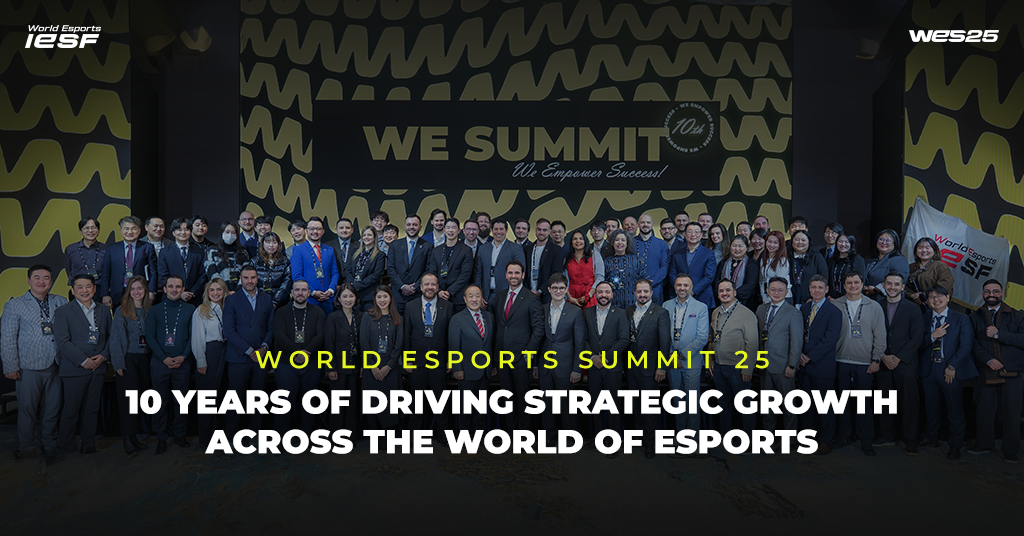
The International Esports Federation (IESF) has successfully wrapped up the significant 10th edition of the World Esports Summit 2025, reinforcing its position as a key event for the progress of the World of Esports and global collaboration.
Focused on the theme “Shaping the World of Esports,” the 2025 Summit convened federations, publishers, global sports organizations, technology innovators, and integrity agencies to collaborate on the future of esports as a structured, credible, and universally unified field.
This anniversary edition showcased a robust and varied group of speakers, demonstrating IESF’s dedication to collaboration across sectors. Significant input was provided by Gustavo Arellano (FIBA), Eric Stranne (FIA), Ray Ng (Moonton), James Yang (Tencent), Valentin Capelli (WADA), Junghwan Han (KADA), Dipesh Makwana (Alibaba Cloud), Tomica Madjercic (Sportradar), and Ivan Dimitrijevic (EXPO 2027 Belgrade), as well as senior esports officials from across the globe.
Conversations during the Summit focused on essential aspects of IESF’s mission, such as governance and federation development, maintaining competitive integrity and anti-doping measures, technological advancements, and fostering sustainable ecosystem growth. The emphasis on diplomacy and collaboration emphasized esports’ increasing alignment with global sports standards and international organizations.
With the 10th edition of the World Esports Summit, IESF has once more showcased its leadership by uniting the global esports community, connecting regions, aligning stakeholders, and establishing common priorities for the future.
With unprecedented involvement, elevated discussions, and a distinct strategic vision, World Esports Summit 2025 represents a pivotal milestone in IESF’s continuous endeavor to influence the future of esports via unity, trustworthiness, and global cooperation.
The post Decade of Impact — World Esports Summit Marks Its 10th Edition appeared first on Eastern European Gaming | Global iGaming & Tech Intelligence Hub.
eSports
Esportes da Sorte to be official sponsor of Brazil’s leading Carnival celebrations in 2026

Tuesday 10th February 2026: Leading Brazilian iGaming company Esportes da Sorte will deliver one of the most extensive Carnival activations in the industry for Carnival 2026, with an official presence at the country’s most iconic and emblematic celebrations.
The brand will serve as the official sponsor of festivities in seven Brazilian capitals — Recife, Salvador, Rio de Janeiro, São Paulo, Belo Horizonte, Natal and Maceió — as well as having a strong presence in Olinda, a city of major cultural significance. The national project will also include special activations in Caicó (RN), a key production hub for the brand’s promotional merchandise.
This initiative reflects Esportes da Sorte’s continued investment in Brazilian popular culture, built over several years across different regions of the country. In 2026, this positioning takes shape through a structured national project that embraces the diversity of Carnival formats — from traditional street blocos to electric trios and major urban stages — with visual identity and activations designed city by city, respecting local symbols, aesthetics and narratives.
“Carnival is part of Brazil’s cultural identity and also part of Esportes da Sorte’s journey. Being present at the country’s main Carnival celebrations is a strategic choice that reinforces our long-term commitment to popular culture, to the cities, and to the people who live this festival in the streets,” said Darwin Filho, CEO of Esportes Gaming Brasil.
“Our Carnival project was designed city by city, respecting the unique characteristics and culture of each sponsored location. The idea is to ensure a real presence and unique experiences for Carnival-goers, integrating the brand organically into the rhythm of each celebration. Whether through blocos, trios or major urban hubs, we want to strengthen ourselves as the brand that elevates the connection between culture and entertainment,” said Marcela Campos, Vice President of Esportes Gaming Brasil.
Beyond its on-the-ground presence, Esportes da Sorte’s Carnival 2026 strategy includes an integrated media and engagement approach, featuring activations across TV, radio, out-of-home media and a national PR operation before, during and after the festivities, focused on high-quality coverage and organic content generation.
The project will also include content and influencer engagement initiatives across multiple locations, expanding organic reach while capturing behind-the-scenes moments and Carnival experiences.
In 2025, the brand was present in more than 100 blocos and street parties across different regions of the country. For 2026, Esportes da Sorte is taking things to the next level, consolidating a nationwide project and reinforcing its leadership role in Brazil’s largest popular event.
The post Esportes da Sorte to be official sponsor of Brazil’s leading Carnival celebrations in 2026 appeared first on Americas iGaming & Sports Betting News.
-

 Compliance Updates5 days ago
Compliance Updates5 days agoIllinois Gaming Board and Attorney General’s Office Issue more than 60 Cease-and-Desist Letters to Illegal Online Casino and Sweepstakes Operators
-

 Latest News5 days ago
Latest News5 days agoLaunch Of A Fresh Online Casino Guide 2026
-

 Canada5 days ago
Canada5 days agoINCENTIVE GAMES PARTNERS WITH LOTO-QUÉBEC TO LAUNCH REAL-MONEY GAMES IN THE PROVINCE OF QUÉBEC, CANADA
-

 Australia5 days ago
Australia5 days agoRegulating the Game 2026 Sydney — One Month Countdown as Sector Leaders Anticipate Inaugural RTG Global Awards
-

 Always Up! x100005 days ago
Always Up! x100005 days agoRing in the Chinese New Year with BGaming’s Seasonal Promotion
-

 Latest News5 days ago
Latest News5 days agoVolcano Power — Hold & Hit 3×3 from Spinomenal
-

 Affigates5 days ago
Affigates5 days agoSoftConstruct AI and Affigates Bring Cutting‑Edge Solutions to AIBC Eurasia 2026 in Dubai
-

 Accra4 days ago
Accra4 days agoKaizen Gaming Launches Betano in Ghana — 20th Regulated Market & Responsible GameTech Expansion








